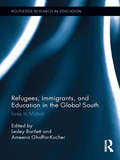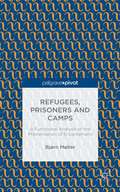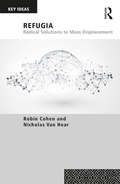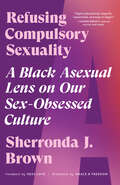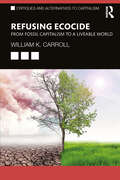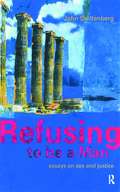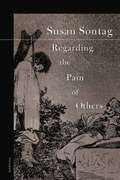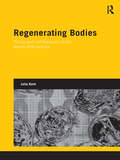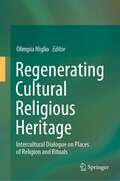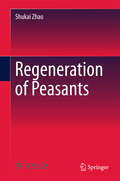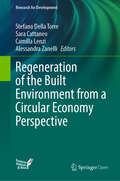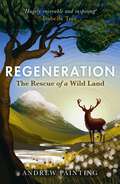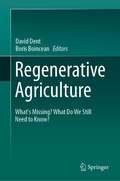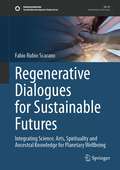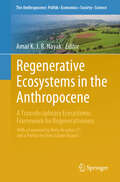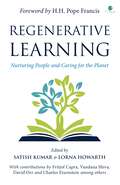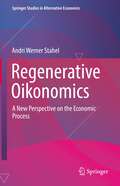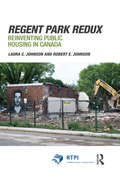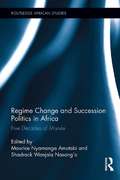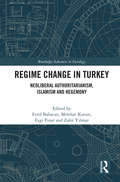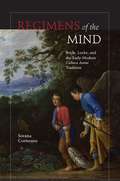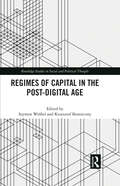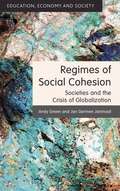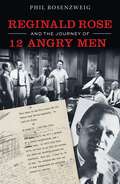- Table View
- List View
Refugees, Immigrants, and Education in the Global South: Lives in Motion (Routledge Research in Education #94)
by Lesley Bartlett Ameena Ghaffar-KucherThe unprecedented human mobility the world is now experiencing poses new and unparalleled challenges regarding the provision of social and educational services throughout the global South. This volume examines the role played by schooling in immigrant incorporation or exclusion, using case studies of Thailand, India, Nepal, Hong Kong/PRC, the Philippines, the United Arab Emirates, Jordan, Kenya, Egypt, South Africa, Senegal, Sudan, Mexico, and the Dominican Republic. Drawing on key concepts in anthropology, the authors offer timely sociocultural analyses of how governments manage increasing diversity and how immigrants strategize to maximize their educational investments. The findings have significant implications for global efforts to expand educational inclusion and equity.
Refugees, Prisoners and Camps: A Functional Analysis of the Phenomenon of Encampment
by Bjørn MøllerWhat do refugee and concentration camps, prisons, terrorist and guerrilla training camps and prisoner of war camps have in common? Arguably they have all followed an 'outsides inside' model, enforcing a dichotomy between perceived 'desirable' and 'undesirable' characteristics. This separation is the subject of Moller's multidisciplinary study. "
Refugia: Radical Solutions to Mass Displacement (Key Ideas)
by Robin Cohen Nicholas Van HearThis is an unusual book. Combining social science fiction, utopianism, pragmatism, sober analysis and innovative social theory, the authors address one of the biggest dilemmas of our age – how to solve the problems arising from mass displacement. As early versions of the solution proposed by Robin Cohen and Nicholas Van Hear filtered out, their vision of a new, networked, transnational archipelago, called Refugia, was met with scepticism by established refugee scholars. Others were more intrigued, more open-minded, or perhaps just holding their fire until this book was finally published. As it at least has the virtue of originality, why not judge the proposal for yourself? Read it and craft your own critique. The authors have initiated an openly pro-refugee vision that all can help to shape. Written in a clear and direct style, this book will appeal to scholars and students in social sciences courses (political and social theory, sociology, anthropology, politics, law, security studies), practitioners in the refugee/migration management, as well as to an informed public ready to engage with this pressing issue.
Refusing Compulsory Sexuality: A Black Asexual Lens on Our Sex-Obsessed Culture
by Sherronda J. BrownFor readers of Ace and Belly of the Beast: A Black queer feminist exploration of asexuality--and an incisive interrogation of the sex-obsessed culture that invisibilizes and ignores asexual and A-spec identity.Everything you know about sex and asexuality is (probably) wrong.The notion that everyone wants sex--and that we all have to have it--is false. It&’s intertwined with our ideas about capitalism, race, gender, and queerness. And it impacts the most marginalized among us. For asexual folks, it means that ace and A-spec identity is often defined by a queerness that&’s not queer enough, seen through a lens of perceived lack: lack of pleasure, connection, joy, maturity, and even humanity.In this exploration of what it means to be Black and asexual in America today, Sherronda J. Brown offers new perspectives on asexuality. She takes an incisive look at how anti-Blackness, white supremacy, patriarchy, heteronormativity, and capitalism enact harm against asexual people, contextualizing acephobia within a racial framework in the first book of its kind. Brown advocates for the &“A&” in LGBTQIA+, affirming that to be asexual is to be queer--despite the gatekeeping and denial that often says otherwise.With chapters on desire, f*ckability, utility, refusal, and possibilities, Refusing Compulsory Sexuality discusses topics of deep relevance to ace and a-spec communities. It centers the Black asexual experience--and demands visibility in a world that pathologizes and denies asexuality, denigrates queerness, and specifically sexualizes Black people.A necessary and unapologetic reclamation, Refusing Compulsory Sexuality is smart, timely, and an essential read for asexuals, aromantics, queer readers, and anyone looking to better understand sexual politics in America.
Refusing Ecocide: From Fossil Capitalism to a Liveable World (Critiques and Alternatives to Capitalism)
by William K. CarrollRefusing Ecocide: From Fossil Capitalism to a Liveable World provides a critical analysis of the central role of fossil capitalism in causing climate change and argues that only alternatives based upon democratic eco-socialism can prevent the deepening of the climate crisis.Employing three core concepts within historical materialism – capitalist accumulation, imperialism and hegemony – it locates the existential threat of our changing climate in the drive for increasing profit and growth, the domination of advanced capitalist states that strip resources and exploit cheap labour, and the consent to the capitalist way of life in the global North. With attention to the ways in which, powered by fossil fuels, capital has subjected the world to its predatory logic, this book charts this history and surveys the damage from the Industrial Revolution to today’s deep civilizational crisis, arguing that the market-based and purely technological solutions of ‘climate capitalism’ are too little, too late.A call for a multifaceted and multi-scalar shift away from capitalist accumulation, imperialism and class hegemony and instead towards democratic eco-socialism, it will appeal to scholars across the social sciences with interests in political and social theory, the environment and sustainability.
Refusing to be a Man: Essays on Social Justice
by John StoltenbergSince its original publication in 1989, Refusing to be a Man has been acclaimed as a classic and widely cited in gender studies literature. In 13 eloquent essays, Stoltenberg articulates the first fully argued liberation theory for men that will also liberate women. He argues that male sexual identity is entirely a political and ethical construction whose advantages grow out of injustice. His thesis is, however, ultimately one of hope - that precisely because masculinity is so constructed, it is possible to refuse it, to act against it and to change. A new introduction by the author discusses the roots of his work in the American civil rights and radical feminist movements and distinguishes it from the anti-feminist philosophies underlying the recent tide of reactionary mens movements.
Regarding the Pain of Others
by Susan SontagHow does the spectacle of the sufferings of others (via television or newsprint) affect us? Are viewers inured--or incited--to violence by the depiction of cruelty? In Regarding the Pain of Others, Susan Sontag takes a fresh look at the representation of atrocity-from Goya's The Disasters of War to photographs of the American Civil War, lynchings of blacks in the South, and the Nazi death camps, to contemporary horrific images of Bosnia, Sierra Leone, Rwanda, Israel and Palestine, and New York City on September 11, 2001. In Regarding the Pain of Others Susan Sontag once again changes the way we think about the uses and meanings of images in our world, and offers an important reflection about how war itself is waged (and understood) in our time.
Regeln brauchen Vertrauen: Warum wir gerne verbieten und uns selbst nicht an alle Gebote halten
by Ruth Linssen Sven SeiboldMenschen brauchen Regeln und Menschen rebellieren gegen Regeln. Regeln geben uns Sicherheit und zugleich schränken sie uns ein. Gegen manche Regeln leisten Menschen aktiv Widerstand oder unterlaufen sie heimlich – mit Negativfolgen für alle. Das Sachbuch zeigt, wie man klug mit Regeln und mit Regelbrechern umgeht. Sie erkennen, warum viele Menschen Regeln einhalten und manche Menschen Regeln brechen. Und warum Vertrauen tatsächlich besser ist als Kontrolle. Aus dem Inhalt: Warum man Regeln braucht, warum sich manche Menschen an Regeln halten und andere nicht, welche Regeln wirksam sind, warum Vorbilder unersetzbar sind, wie man Gutwillige bei der Stange hält, wie man mit Regelbrüchen umgeht, wie man böse Fallen vermeidet. Über die Autor:innen: Sven Seibold ist Psychologe und Professor für Wirtschaftspsychologie. Er berät Unternehmen in Fällen von Mobbing, Burn-out, Wirtschaftskriminalität und Wirtschaftsspionage. Ruth Linssen ist Professorin für Soziologie und Recht an der Fachhochschule Münster. Sie berät und schult Behörden und Unternehmen zu den Themen Compliance und Korruptionsprävention.
Regenerating Bodies: Tissue and Cell Therapies in the Twenty-First Century (Genetics and Society)
by Julie KentThis exciting book examines how human tissues and cells are being exchanged, commodified and commercialized by new health technologies. Through a discussion of emergent global ‘tissue economies’ the author explores the social dynamics of innovation in the fields of tissue engineering and stem cell science. The book explores how regenerative medicine configures and conceptualizes bodies and argues that the development of regenerative medicine is a feminist issue. In Regenerating Bodies, Kent critically examines the transformative potential of regenerative medicine and whether it represents a paradigm shift from more traditional forms of biomedicine. The book shows that users of these technologies are gendered and women’s bodies are enrolled in the production of them in particular ways. So what is the value of a feminist bioethics for thinking about the ethical issues at stake? Drawing on extensive qualitative field research, Kent examines the issues around donation, procurement, banking and engineering of human tissues, and presents an analysis of the regulatory and policy debates surrounding these practices within Europe and the UK. The book considers the claims that regenerative medicine represents exciting possibilities for treating the diseases of ageing bodies, critically assessing what kind of futures are embodied in tissue and cell based therapies. It will be of interest to a wide range of scholars and students within the social sciences, in health technology studies, bioethics, feminist studies, and gender and health studies.
Regenerating Cultural Religious Heritage: Intercultural Dialogue on Places of Religion and Rituals
by Olimpia NiglioThis book introduces important reflections on understanding the meaning of cultural-religious heritage in an international context and their relationship with issues of sustainability at the local community level. Through a holistic approach, the book charts new courses in analyzing different cultural policies and methods for preserving and enhancing cultural heritage. Stemming from an intercultural seminar promoted by the International Scientific Committee Places of Religion and Ritual (ICOMOS PRERICO) under the theme of “Reuse and regenerations of cultural-religious heritage in the world: Comparison among cultures,” the book examines the scientific diplomacy and cultural strategies promoted by countries in dialogue with the UN 2030 Agenda, as well as Agenda 21 for Culture. The book seeks to reinforce the value of local cultural policies for supporting and enhancing cultural-religious heritage through specific programs and collaborations in dialogue with government policies. This collection is relevant to scholars working in areas relating to cultural heritage, religious heritage, architectural restoration, protection of the local inheritances, law, and management of the cultural sites.
Regeneration of Peasants
by Shukai ZhaoThis book focuses on analyzing the inter-relationship between Chinese peasants and the reform and it tries to understand the conditions of peasants during the course of the Chinese social transition. This book argues that Chinese peasants are the most important force that keeps the reform going. More importantly, this book argues that this force comes from the peasants' pursuit of their own social, political and economic interest, not some spontaneous demand for "reform" itself. This inherent relationship between the peasants and the reform is summarized into five major relationships: the inter-relationship between peasants and the central government; between peasants and local government; between peasants and rural democratization; between peasants and social constructions; and between peasants and local officials. These five inter-relationships are the prime mechanism for the interaction between Chinese peasants and the reform, and these forms the basis for understanding and analyzing the inter-relationship between the state and peasants.
Regeneration of the Built Environment from a Circular Economy Perspective (Research for Development)
by Alessandra Zanelli Camilla Lenzi Stefano Della Torre Sara CattaneoThis open access book explores the strategic importance and advantages of adopting multidisciplinary and multiscalar approaches of inquiry and intervention with respect to the built environment, based on principles of sustainability and circular economy strategies. A series of key challenges are considered in depth from a multidisciplinary perspective, spanning engineering, architecture, and regional and urban economics. These challenges include strategies to relaunch socioeconomic development through regenerative processes, the regeneration of urban spaces from the perspective of resilience, the development and deployment of innovative products and processes in the construction sector in order to comply more fully with the principles of sustainability and circularity, and the development of multiscale approaches to enhance the performance of both the existing building stock and new buildings. The book offers a rich selection of conceptual, empirical, methodological, technical, and case study/project-based research. It will be of value for all who have an interest in regeneration of the built environment from a circular economy perspective.
Regeneration: The Rescue of a Wild Land
by Andrew PaintingIn 1995 the National Trust for Scotland acquired Mar Lodge Estate in the heart of the Cairngorms. Home to over 5,000 species, this vast expanse of Caledonian woodlands, subarctic mountains, bogs, moors, roaring burns and frozen lochs could be a place where environmental conservation and Highland field sports would exist in harmony. The only problem was that due to centuries of abuse by human hands, the ancient Caledonian pinewoods were dying, and it would take radical measures to save them. After 25 years of extremely hard work, the pinewoods, bogs, moors and mountains are returning to their former glory. Regeneration is the story of this success, featuring not only the people who are protecting the land and quietly working to undo the wrongs of the past, but also the myriad creatures which inspire them to do so. In addition, it also tackles current controversies such as raptor persecution, deer management and rewilding and asks bigger questions about the nature of conservation itself: what do we see when we look at our wild places? What should we see?
Regenerative Agriculture: What’s Missing? What Do We Still Need to Know?
by David Dent Boris BoinceanThe food system is our last coal-fired power station, our last diesel engine. This book is a trans-disciplinary approach to what needs to be done to make our food system sustainable and to regenerate soil and water resources, habitat, economy and society. The book brings back classical principles of agronomy and integrates economic, agro-ecological and social perspectives, drawing on a wealth of expertise on the political economy of the food system, Conservation Agriculture, and long-term field experiments. Regenerative agriculture builds on known knowns – like crop rotation, water and nutrient requirements, soil and water conservation, farm-gate prices, international trade and supply chains. It grapples with known unknowns – like weed, pest and disease control without agrochemicals, cover crops for profit as well as protection, mitigating and adapting to the climate crisis, resilience and tipping points in ecosystems, farming systems and societies, and how we can pay for imperative changes. Lastly, it acknowledges unknown unknowns – the things we are oblivious to but which we really must know – like how to liberate the ghettos of the mind inhabited by farmers, agronomists, politicians and societies.
Regenerative Dialogues for Sustainable Futures: Integrating Science, Arts, Spirituality and Ancestral Knowledge for Planetary Wellbeing (Sustainable Development Goals Series)
by Fabio ScaranoThis book is about sustainability in its broadest sense. It argues that the ongoing science-policy dialogue on sustainable development (as framed by the United Nations’ Sustainable Development Goals) is insufficient to drive the planet to desired sustainable futures. This conversation, followed by transformative action, must be inclusive of other forms of interpretation of reality (arts, spirituality, and ancestral knowledge) and non-modern cosmovisions. This is more a book about dialogues than about the common dualism problem/solution, and such dialogues are approached as an essential trigger of regeneration. The book takes the reader from a historical perspective of the human-nature relationship through to a discussion on sustainable futures as utopias. The optimism conveyed by the book is justified by a plethora of global examples of such regenerative dialogues.
Regenerative Ecosystems in the Anthropocene: A Transdisciplinary Ecosystemic Framework for Regenerativeness (The Anthropocene: Politik—Economics—Society—Science #38)
by Amar K. J. R. NayakThe book offers a transdisciplinary eco-systemic framework for analysis of ecosystems. It uses eight dimensions (economic-social-political-environmen-tal) and 40 factors to diagnose degenerating ecosystems and to synthesize regenerative ecosystems amid growing uncertainty, and inequality in the Anthropocene. Chapter 1 broadly defines the `all interacting evolving systems science' (AIESS) approach in terms of its eco-systemic and transdisciplinary action research methodology. Chapter 2 provides a detailed explanation of the AIESS approach through the four concepts of interconnectedness, interdependence, interactions, and intent to diagnose degeneration and synthesize regenerative systems. Part 1 of the book discusses the issues and approaches to Regenerativeness. Part 2, 3, 4, and 5 illustrate cases of regenerative systems in different ecosystems viz. natural, rural-indigenous, urban, and industrial ecosystems.Not only the researchers and scholarsin systems science, systems dynamics, systems design, and sustainable transition strategies but also the policy makers, corporate leaders, and development experts will greatly benefit from this book.1. Presents a ground breaking explanation of the science of change in the Anthropocene and in epochs prior to it through its all interacting evolving systems science framework. 2. Provides a unique transdisciplinary eco-systemic framework as a methodology to diagnose the complex degenerating ecosystems and to synthesize regenerative ecosystems in different geographies of the world. 3. Through various cases from different ecosystems viz., natural ecosystems, rural-indigenous ecosystems, urban ecosystems, and industrial ecosystems, the book presents the challenges as well as the steps and processes to synthesize regenerative ecosystems.
Regenerative Learning: Nurturing People and Caring for the Planet
by Satish Kumar Lorna HowarthBe The Change! Are you a policy maker? Parent? Teacher. You'll find in this book fresh ideas as well as practical solutions. Learn how we can make the whole world of education more inspiring – and more green. Education can be – and it should be! – more inspiring, holistic, integrated, creative, and joyous! And that isn't a mere pipe dream. This book will help you to achieve it. Published for the 30th anniversary of Schumacher College, this collection of essays is on a subject of urgent importance for a world afflicted by climate change, inequality, mass disadvantage, and pandemics.The college is synonymous with the effort to create a model of learning that develops alumni who have the skills and passions that will make the contemporary world a better place. Contributors include: Fritjof Capra, Vandana Shiva, David Orr, Charles Eisenstein, Gunter Pauli, Anthony Seldon, Jon Alexander, Alan Boldon, Pavel Cenkl, Lauren Elizabeth Clare, Joseph Bharat Cornell, Guy Dauncey, Alan Dyer, Natalia Eernstman, Guillem Ferrer, Herbert Girardet, Donald Gray, Stephan Harding, Ina Matijevic, Helena Norberg-Hodge, Dana Littlepage Smith, Isabel Losada, Thakur S. Powdyel, and Colin Tudge.
Regenerative Oikonomics: A New Perspective on the Economic Process (Springer Studies in Alternative Economics)
by Andri Werner StahelThis book presents a unique real-world-centred approach to economic life from a phenomenological approach. It offers a much-needed alternative to conventional economic thinking, giving a transdisciplinary depiction of the economic process’s social, cultural, technological, political, and ecological dimensions. Doing so appeals to students and researchers in economics aiming to get an alternative to the reductionist model-based approach.Written in a jargon-free and non-technical way, it appeals to non-economists alike and those seeking a more profound and living understanding of the economic process. What is the role of nature in the economic process? Is there more to economics than we have been told? Do we have infinite needs? What are these needs? Can we keep on growing forever? Does economic growth improve our wellbeing? Why is the income gap widening? What is the role of financial capital in our current world? Are there other forms of producing, distributing, and consuming wealth beyond markets? What are the functions of markets, and how do they work in the real world? These and many other aspects are discussed in living and holistic ways in this book. It is a must-read for all those interested in gaining a more profound and genuine understanding of our current reality and those looking for ways out of our current crises.
Regent Park Redux: Reinventing Public Housing in Canada (RTPI Library Series)
by Laura Johnson Robert JohnsonRegent Park Redux evaluates one of the biggest experiments in public housing redevelopment from the tenant perspective. Built in the 1940s, Toronto’s Regent Park has experienced common large-scale public housing problems. Instead of simply tearing down old buildings and scattering inhabitants, the city’s housing authority came up with a plan for radical transformation. In partnership with a private developer, the Toronto Community Housing Corporation organized a twenty-year, billion-dollar makeover. The reconstituted neighbourhood, one of the most diverse in the world, will offer a new mix of amenities and social services intended to "reknit the urban fabric." Regent Park Redux, based on a ten-year study of 52 households as they moved through stages of displacement and resettlement, examines the dreams and hopes residents have for their community and their future. Urban planners and designers across the world, in cities facing some of the same challenges as Toronto, will want to pay attention to this story.
Regime Change and Succession Politics in Africa: Five Decades of Misrule (Routledge African Studies #9)
by Maurice Nyamanga Amutabi Shadrack Wanjala Nasong'OBringing together scholars from a wide array of disciplines - including anthropology, economics, history, sociology, and political science - this volume addresses the problems of the regime change and state failure in Africa in the context of the global economy, but from a specifically African perspective, arguing that the underdevelopment of the African economy is linked to the underdevelopment of the continents' nation states.
Regime Change in Turkey: Neoliberal Authoritarianism, Islamism and Hegemony (Routledge Advances in Sociology)
by Errol BabacanTurkey’s new presidential regime, promoted and shaped by the Justice and Development Party (AKP), has become a global template for rising authoritarianism. Its violence intensifi es the exigency for critical analysis. By focusing on neoliberal authoritarian, hegemonic and Islamist aspects, this book sheds light on long- term dynamics that resulted in the regime transformation. It presents a comprehensive study at a time when rising authoritarianism challenges liberal democracies on a global scale.Reaching from critical political economy and state theory to media, gender and cultural studies, this volume covers a range of studies that transcend disciplinary boundaries. These essays challenge the narrative of an "authoritarian turn" that splits the AKP era into democratic and authoritarian periods. Hence, recent transformation is analyzed in a broad historical framework which is sensitive to both continuities and shifts. Studies that explore moments of resistance and relate the political development in Turkey to rising authoritarianism and the crisis- driven trajectory of neoliberalism on a global scale are included in this effort. Since the advancement of neoliberal policies in conjunction with the religious project that is pushed forward by the AKP suggests that the ongoing transformation may well advance into a more totalitarian regime, this book strives to inform struggles that are trying to resist and reverse this development. By reviewing the dynamics and impacts of recent authoritarian developments, it calls on critical scholars to further seek out potentials and dynamics of opposition in the current authoritarian era.
Regimens of the Mind
by Sorana CorneanuIn Regimens of the Mind, Sorana Corneanu proposes a new approach to the epistemological and methodological doctrines of the leading experimental philosophers of seventeenth-century England, an approach that considers their often overlooked moral, psychological, and theological elements. Corneanu focuses on the views about the pursuit of knowledge in the writings of Robert Boyle and John Locke, as well as in those of several of their influences, including Francis Bacon and the early Royal Society virtuosi. She argues that their experimental programs of inquiry fulfill the role of regimens for curing, ordering, and educating the mind toward an ethical purpose, an idea she tracks back to the ancient tradition of cultura animi. Corneanu traces this idea through its early modern revival and illustrates how it organizes the experimental philosophers' reflections on the discipline of judgment, the study of nature, and the study of Scripture. It is through this lens, the author suggests, that the core features of the early modern English experimental philosophy--including its defense of experience, its epistemic modesty, its communal nature, and its pursuit of "objectivity"--are best understood.
Regimes of Capital in the Post-Digital Age (Routledge Studies in Social and Political Thought)
by Szymon Wróbel Krzysztof SkoniecznyRegimes of Capital in the Post-digital Age provides a view of the current state of capitalism, through the interrogation of key diagnoses offered by philosophers and social theorists. With attention to questions about the manner in which the advent of the information age has shaped capitalism, the implications of the post-digital age for social capital, and the possible forms of resistance to the problematic aspects of capitalism, it will appeal to scholars of sociology, philosophy and social theory with interests in critical theory, capitalist society and digital culture.
Regimes of Social Cohesion
by Andy Green Jan Germen JanmaatBuilding on Green and Janmaat's previous work on education, equality and social cohesion, this book analyses the various mechanisms that hold different societies together and how these are withstanding the strains fo the current economic crisis. In an original, and highly interdisciplinary, mixed method approach, drawing on evidence from historical soicology, political science and political economy, Green and Janmaat identify four major traditions of social cohesion in developed western and east Asian societies, each with specific institutional and cultural foundations. An extensive statistical analysis of contemporary administrative and attitudinal data for over 30 countries demonstrates that there are still distinctive 'regimes of social cohesion' in 'liberal, ' 'social market' and 'social democratic' countries and that they achieve social bonding in quite different ways. As the crisis of globalization unfolds in the wake of the global financial crisis, social cohesion in each regime is vulnerable at different points
Reginald Rose and the Journey of 12 Angry Men
by Phil RosenzweigFinalist, 2021 Wall Award (Formerly the Theatre Library Association Award)The untold story behind one of America’s greatest dramasIn early 1957, a low-budget black-and-white movie opened across the United States. Consisting of little more than a dozen men arguing in a dingy room, it was a failure at the box office and soon faded from view.Today, 12 Angry Men is acclaimed as a movie classic, revered by the critics, beloved by the public, and widely performed as a stage play, touching audiences around the world. It is also a favorite of the legal profession for its portrayal of ordinary citizens reaching a just verdict and widely taught for its depiction of group dynamics and human relations. Few twentieth-century American dramatic works have had the acclaim and impact of 12 Angry Men.Reginald Rose and the Journey of “12 Angry Men” tells two stories: the life of a great writer and the journey of his most famous work, one that ultimately outshined its author. More than any writer in the Golden Age of Television, Reginald Rose took up vital social issues of the day—from racial prejudice to juvenile delinquency to civil liberties—and made them accessible to a wide audience. His 1960s series, The Defenders, was the finest drama of its age and set the standard for legal dramas. This book brings Reginald Rose’s long and successful career, its origins and accomplishments, into view at long last.By placing 12 Angry Men in its historical and social context—the rise of television, the blacklist, and the struggle for civil rights—author Phil Rosenzweig traces the story of this brilliant courtroom drama, beginning with the chance experience that inspired Rose, to its performance on CBS’s Westinghouse Studio One in 1954, to the feature film with Henry Fonda. The book describes Sidney Lumet’s casting, the sudden death of one actor, and the contribution of cinematographer Boris Kaufman. It explores the various drafts of the drama, with characters modified and scenes added and deleted, with Rose settling on the shattering climax only days before filming began.Drawing on extensive research and brimming with insight, this book casts new light on one of America’s great dramas—and about its author, a man of immense talent and courage.Author royalties will be donated equally to the Feerick Center for Social Justice at Fordham Law School and the Justice John Paul Stevens Jury Center at Chicago-Kent College of Law.
